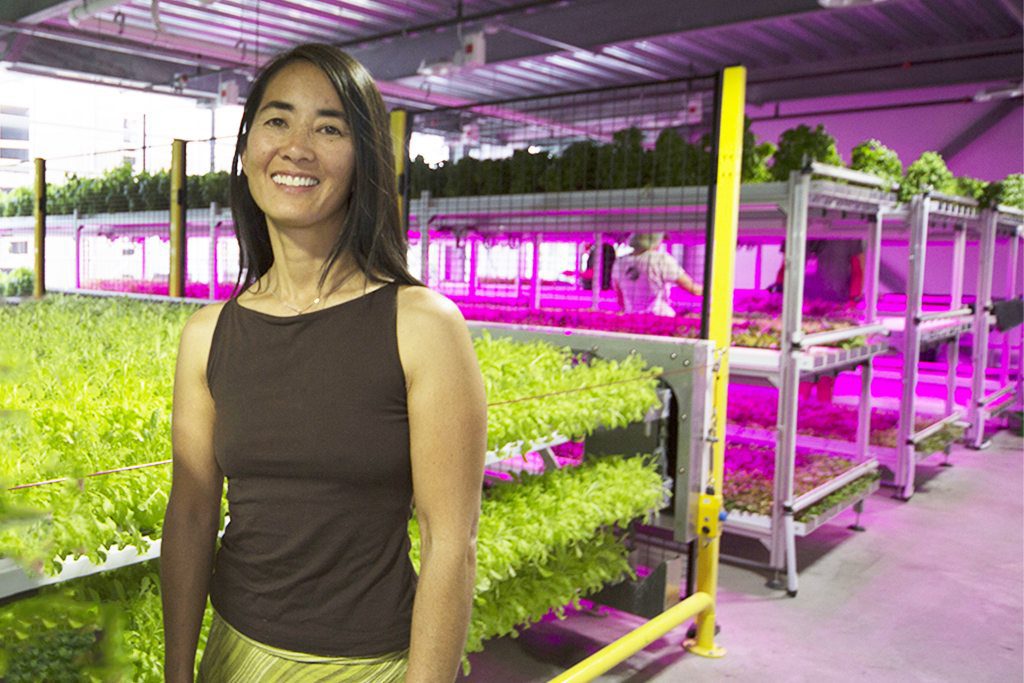Skift Take
Penny McBride, co-founder of Vertical Harvest, is spreading the word about how sustainable food production and new economic business models can help build strong communities.
This sponsored content was created in collaboration with a Skift partner.
The Unbound Collection by Hyatt and SkiftX present The Freedom to be Extraordinary content series, which explores how breaking free from convention can lead to extraordinary success. These conversations will reveal how leading innovators and entrepreneurs approach creativity and how they’re embracing the freedom to be extraordinary.
Penny McBride, co-founder of Vertical Harvest, has made it her mission to educate others about how the vertical farming industry can not only improve the way we eat, but the way we build communities.
Vertical Harvest, a 13,500 square foot, three-story hydroponic greenhouse in Jackson Hole, Wyoming, sells locally grown, fresh vegetables year round to local restaurants, grocery stores and directly to consumers through on-site sales. “I’ve always loved the idea of bringing back the local farmer, and it’s amazing to see the resurgence going on. Young people have become interested in farming again, as well as creating greater food security and sustainable production,” she says.
Beyond being an environmentally friendly and space efficient means of farming which benefits both the producer and consumer, Vertical Harvest also plays a large role in the local community and economy. The greenhouse provides meaningful employment to local residents with intellectual and physical disabilities in a fully integrated workplace. The program is designed to personalize the employment relationship between employee and employer in a way that meets the needs of both, recognizing the employee’s strengths, conditions, and interests.
“I believe it’s a model that more employers should use. It’s not as complicated of a system as people think. It draws on people’s strengths and personal motivations, and allows employers to better understand their workers. It leads to better job retention and employee happiness, and is a total win-win for both groups,” McBride says.
She’s been a firsthand witness to how farming in the U.S. has evolved over the last three generations—and how much of a struggle it is for today’s small-scale farmer to survive. Her grandfather, an immigrant from Japan, started a small family farm in Colorado as a young man, supplying food to the local grocery stores. By the time her father took it over, it grew to a massive operation. Despite its growth, the farm was facing stricter regulations and changes in how grocery stores purchased their food, mainly buying products from large-scale farms. In order to survive in the new world of industrialized farming, the farm had to shift to a monocropping model, which was contrary to how the farm was founded.
“The traditional food system in the U.S. is broken,” she says. “What’s exciting about this new farming system is that it gives people the ability to address change and get involved on so many different levels. It creates and enhances community, allows people to cross boundaries, and provides solutions to so many of the challenges we face today.”
While there are a ton of people out there who support what McBride and Vertical Harvest are doing, she says the biggest challenge is breaking away from convention. “Swimming against the tide is not always easy. … It’s important for any organization trying to create positive change to celebrate the milestones and accomplishments along the way, no matter how big or small. You need that spark to create the magic and motivation for yourself and others involved.”
Read more articles from the The Unbound Collection by Hyatt interview series below.
The Unbound Collection by Hyatt
This content was created collaboratively by The Unbound Collection by Hyatt and Skift’s branded content studio, SkiftX.
Have a confidential tip for Skift? Get in touch

